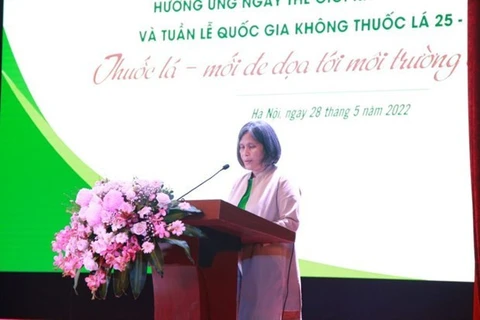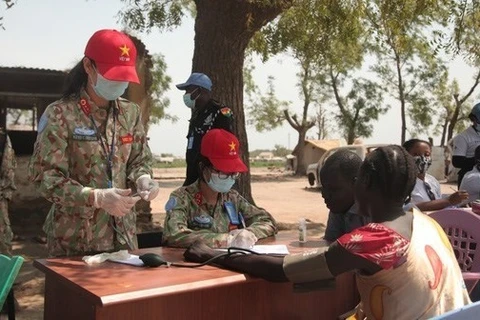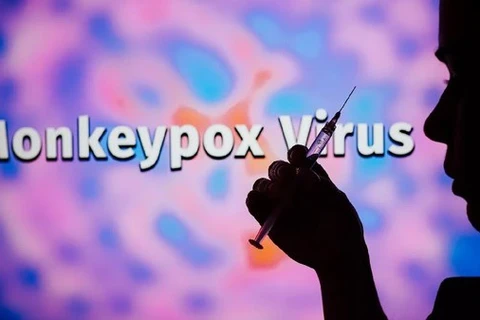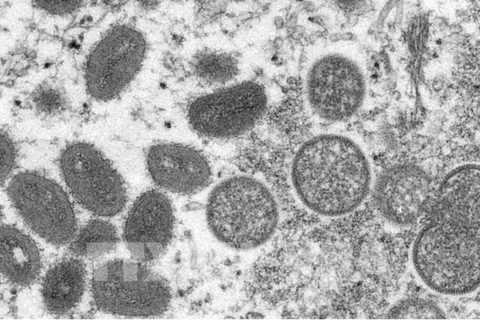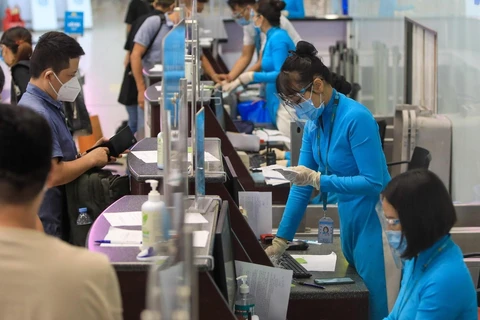Hanoi (VNA) – The World Health Organisation (WHO) will continue to share information with Vietnam on developments of monkeypox and support the country in the prevention and control of the disease, Dr. Socorro Escalante, Acting WHO Representative in Vietnam told the media on July 26.
The WHO representative noted that after considering the emerging epidemiological trends and the transmission of the disease among countries, on July 23, WHO Director-General Adhanom Ghebreyesus decided to declare monkeypox as a global health emergency.
Between January 1 and July 20, the world recorded nearly 15,000 cases of monkeypox in 72 countries and territories and in all six regions worldwide. This is a significant increase from more than 3,000 cases at the beginning of May 2022, causing global concern, she said.
Escalante said that WHO has assisted the Ministry of Health of Vietnam in building temporary expertise guidelines in the field of laboratory monitoring and testing, including activities to strengthen the capacity of supervision and testing systems, as well as in conducting activities related to temporarily rapid response, clinical management, infection control for monkeypox.
WHO has also helped Vietnam in popularising the risk of monkeypox outbreak, as well as guided the country in vaccination.
The WHO will provide Vietnam with updated instructions and national interim guidelines depending on the development of the disease, while providing testing bio-products to public health facilities and hospital systems nationwide, she said.
 Between January 1 and July 20, the world recorded nearly 15,000 cases of monkeypox in 72 countries and territories and in all six regions worldwide. (Photo: Reuters/VNA) According to the representative, WHO has designed scenarios that countries may face, and classified the scenarios following groups of countries depending on the real situation.
Between January 1 and July 20, the world recorded nearly 15,000 cases of monkeypox in 72 countries and territories and in all six regions worldwide. (Photo: Reuters/VNA) According to the representative, WHO has designed scenarios that countries may face, and classified the scenarios following groups of countries depending on the real situation.
For countries that have yet to record any monkeypox case like Vietnam, WHO has given some temporary recommendations regarding responding measures, including activating the inter-sectoral coordination mechanism to enhance readiness to respond to monkeypox, and prevent it from spreading. The operation of the Public Health Emergency Response Centre under the Ministry of Health needs to be activated, when necessary, with the participation of inter-agency, she stated.
Escalante underlined the need to strengthen the monitoring system as well as the laboratory diagnostic capabilities, including testing and sample transport procedures, along with risk communications and the updating of guidelines in managing clinical cases. She also pointed to the necessity to raise public awareness of the transmission of monkeypox to take measures to protect the community, identify signs and symptoms in high-risk communities.
Along with enhancing the disease supervision system, WHO recommended that Vietnam actively update and share information for local residents on disease prevention measures as well as ways to protect themselves in case monkeypox may enter Vietnam.
The WHO representative also recommended that there is no need to apply restriction measures related to international travel of specific groups or the general population. WHO encourages countries to adhere to interim recommendations, she stressed.
She added that currently, WHO does not recommend mass vaccination against monkeypox./.
The WHO representative noted that after considering the emerging epidemiological trends and the transmission of the disease among countries, on July 23, WHO Director-General Adhanom Ghebreyesus decided to declare monkeypox as a global health emergency.
Between January 1 and July 20, the world recorded nearly 15,000 cases of monkeypox in 72 countries and territories and in all six regions worldwide. This is a significant increase from more than 3,000 cases at the beginning of May 2022, causing global concern, she said.
Escalante said that WHO has assisted the Ministry of Health of Vietnam in building temporary expertise guidelines in the field of laboratory monitoring and testing, including activities to strengthen the capacity of supervision and testing systems, as well as in conducting activities related to temporarily rapid response, clinical management, infection control for monkeypox.
WHO has also helped Vietnam in popularising the risk of monkeypox outbreak, as well as guided the country in vaccination.
The WHO will provide Vietnam with updated instructions and national interim guidelines depending on the development of the disease, while providing testing bio-products to public health facilities and hospital systems nationwide, she said.
 Between January 1 and July 20, the world recorded nearly 15,000 cases of monkeypox in 72 countries and territories and in all six regions worldwide. (Photo: Reuters/VNA)
Between January 1 and July 20, the world recorded nearly 15,000 cases of monkeypox in 72 countries and territories and in all six regions worldwide. (Photo: Reuters/VNA) For countries that have yet to record any monkeypox case like Vietnam, WHO has given some temporary recommendations regarding responding measures, including activating the inter-sectoral coordination mechanism to enhance readiness to respond to monkeypox, and prevent it from spreading. The operation of the Public Health Emergency Response Centre under the Ministry of Health needs to be activated, when necessary, with the participation of inter-agency, she stated.
Escalante underlined the need to strengthen the monitoring system as well as the laboratory diagnostic capabilities, including testing and sample transport procedures, along with risk communications and the updating of guidelines in managing clinical cases. She also pointed to the necessity to raise public awareness of the transmission of monkeypox to take measures to protect the community, identify signs and symptoms in high-risk communities.
Along with enhancing the disease supervision system, WHO recommended that Vietnam actively update and share information for local residents on disease prevention measures as well as ways to protect themselves in case monkeypox may enter Vietnam.
The WHO representative also recommended that there is no need to apply restriction measures related to international travel of specific groups or the general population. WHO encourages countries to adhere to interim recommendations, she stressed.
She added that currently, WHO does not recommend mass vaccination against monkeypox./.
VNA

